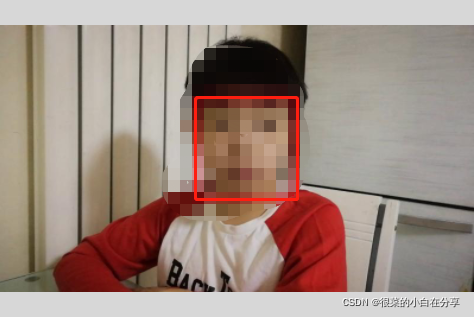前端 Canvas 图像标记
作者:
@ 很菜的小白在分享
日期:2021年12月22日
介绍
为什么要做图像标记?我们开发过程可能会涉及到需要在一张图片上做记号,例如:
人脸识别
,我们可能需要将识别到的人脸框选起来,类似我们手机相机对焦人脸的效果。本文主要是记录下本人在开发智能AI教育平台时,实现图像标记。
方案选择
方案一
html + css + js
(放弃)
这里我只能说它是一种方案,但不是最优的,其次扩展性不是很强 (大家肯定都想写出一劳永逸的code),如果后期需要对标记后的图片入库这类操作时,这种方案就无法实现了。
方案二
canvas
canvas 较方案一扩展性就很强了,它不仅足够灵活,而且可以实现复杂的效果,例如绘制不规则图形时,重要的是绘制的内容可以更好的适配大小,并且也支持导出。
实现
获取图片信息
这里主要是需要通过图片尺寸信息来动态生成 canvas 画布大小,动态的目的就是确保我们可以更好的适配绘制样式,下文会继续提到。
/**
* @description: 获取识别后的图像
* @param {Object} options 配置对象
* @param {Function} cb 回调函数
* @return {*}
* options {
* url: 图像地址,
* types: 'features,check,checkName', // features: 特征点 check: 人脸检测 checkName: 人脸识别
* data: 图像数据
* }
*/
export const getRecognitImage = (options, cb) => {
const types = options.types
// 获取图片类型
let outType = options.url.substring(options.url.lastIndexOf('.') + 1)
if (outType == 'jpg') outType = 'jpeg'
// 创建图片对象
const img = new Image()
img.src = options.url + '?tamp=' + new Date().getTime() // 此处添加时间戳防止因为缓存导致跨域问题
img.crossOrigin = 'Anonymous'
img.onload = () => {
// 获取图片大小
const width = img.width
const height = img.height
}
}
动态生成 canvas并绘制图片
// 此处省略之前的代码
img.onload = () => {
// 创建画布
const canvas = document.createElement('canvas')
const ctx = canvas.getContext('2d')
// 设置画布大小与图片大小一致
const width = img.width
const height = img.height
canvas.width = width
canvas.height = height
// 绘制图片
ctx.drawImage(img, 0, 0, width, height);
// 绘制特征点
if (types.includes('features')) {
drawPoint(ctx, canvas, options)
}
// 绘制人脸区域
if (types.includes('check') || types.includes('checkName')) {
drawRect(ctx, 'check', types.includes('checkName'), canvas, options)
}
}
根据坐标信息进行标记
数据格式
// 这里点的信息按照 上-右-下-左 的顺序存储
[
{
"points": [
{
"x": 10,
"y": 10
}, {
"x": 30,
"y": 10
}, {
"x": 30,
"y": 60
}, {
"x": 10,
"y": 60
}
]
}
]
这里做了很多适配处理,目的就是为了绘制出来的图片效果更自然些
效果图
/**
* @description: 绘制框
* @param {*}
* @return {*}
* @param {*} ctx 画布上下文
* @param {*} type 绘制类型
* @param {*} checkName 是否绘制名称
* @param {*} canvas canvas 信息
* @param {*} options 绘制信息
*/
function drawRect(ctx, check, checkName, canvas, options) {
let canvasW = canvas.width
let lineWidth = 2;
// 依据图片大控制框线的宽度,适配框线的粗细
if (canvasW > 1000) {
lineWidth = canvasW.toString().substring(0, 1) * 3
}
options.data.bbox.forEach((item, index) => {
ctx.strokeStyle = "#FF0000";
ctx.lineWidth = lineWidth;
ctx.beginPath()
// 获取第一个点和最后一个点
let first = item.points[0]
let last = item.points[item.points.length-1]
// 初始化画笔的位置
ctx.moveTo(first .x, first .y)
// 根据点位绘制图像
for (let i = 0, len=item.points.length; i < len; i++) {
let that = item.points[i]
let next = item.points[i+1]
ctx.lineTo(next.x, next.y)
}
ctx.stroke();
ctx.fillStyle = "#FFFFFF";
// 绘制带名称的情况
if (checkName) {
ctx.fillStyle = "#FF0000";
let name = item.text
if (name == 'no name') name = '未知'
// 计算字体大小,用于适配
let fontSize = (last.y - first.y) / (lineWidth*4)
ctx.font = fontSize+'px bold'
// 获取该字体大小下文本的宽度
let textWidth = ctx.measureText(name)
/*
设置文本框的宽度
expression: textWidth.width + 文本绘制的 X 位置
*/
let rectWidth = textWidth.width + (first.x + lineWidth*2)
// 设置最小宽度值为框的宽度
if (rectWidth < Math.abs(item.points[1].x - first.x)) {
rectWidth = Math.abs(item.points[1].x - first.x)
}
// 这里除 6 就是将框的高度分为6等分,将文本置于框底部
ctx.fillRect(first.x, last.y - (last.y / 6), rectWidth, (last.y / 6))
ctx.fillStyle = "#FFFFFF"
ctx.textBaseline = 'bottom'
ctx.fillText(name, first.x + lineWidth*2, last.y-lineWidth)
ctx.fillStyle = "#FFFFFF"
}
})
}

在项目中还进行了人脸特征点的绘制,点的绘制就更简单了,直接上代码
/**
* @description: 绘制点
* @param {*}
* @return {*}
* @param {*} ctx 画布上下文
*/
function drawPoint(ctx, canvas, options) {
let canvasW = canvas.width
let rang = 3;
// 根据 canvas 大小适配点的大小
if (canvasW > 1000) {
rang = canvasW.toString().substring(0, 1) * 3
} else if (canvasW<400) {
rang = 1
}
options.data.landmark.forEach(item => {
item.forEach(val => {
ctx.beginPath()
ctx.arc(val[0], val[1], rang, 0, 2*Math.PI)
ctx.fill()
})
})
}
生成图片
通过
canvas.toDataURL()
生成base64的图片
export const getRecognitImage = (options, cb) => {
const types = options.types
// 获取图片类型
let outType = options.url.substring(options.url.lastIndexOf('.') + 1)
if (outType == 'jpg') outType = 'jpeg'
// 创建图片对象
const img = new Image()
img.src = options.url + '?tamp=' + new Date().getTime() // 此处添加时间戳防止因为缓存导致跨域问题
img.crossOrigin = 'Anonymous'
img.onload = () => {
// 创建画布
const canvas = document.createElement('canvas')
const ctx = canvas.getContext('2d')
ctx.save()
// 设置画布大小为图片大小
const width = img.width
const height = img.height
canvas.width = width
canvas.height = height
// 绘制图片
ctx.drawImage(img, 0, 0, width, height);
// 设置绘制样式为白色
ctx.fillStyle = '#FFFFFF'
if (types.includes('features')) {
drawPoint(ctx, canvas, options)
}
if (types.includes('check') || types.includes('checkName')) {
drawRect(ctx, 'check', types.includes('checkName'), canvas, options)
}
ctx.save()
// 生成图片
cb(canvas.toDataURL("image/" + outType, 1))
}
}
(完)
版权声明:本文为weixin_43809685原创文章,遵循 CC 4.0 BY-SA 版权协议,转载请附上原文出处链接和本声明。